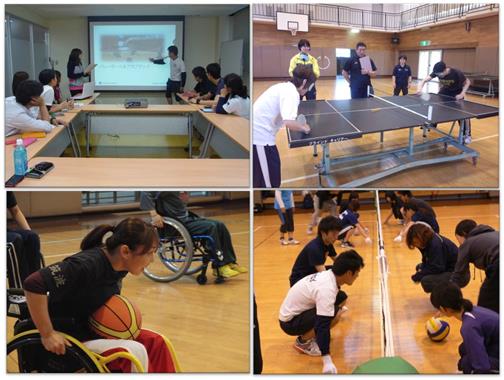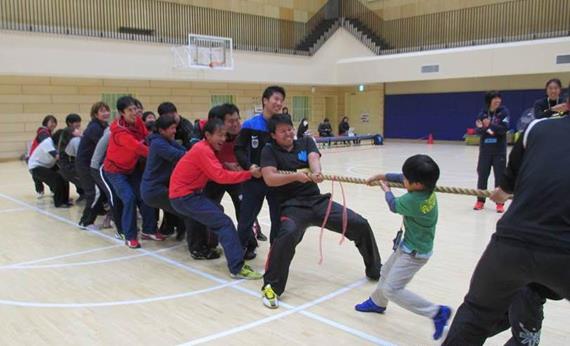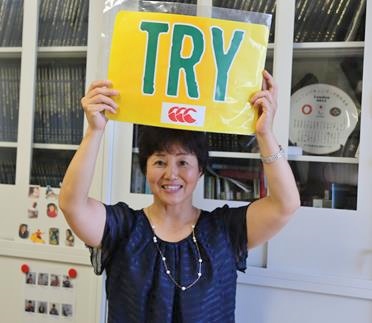TSUKUBA FUTURE
#064 Enjoying Adapted Sports
Associate Professor SAITO Mayumi, Faculty of Health and Sport Sciences

The year 2016 is an Olympic/Paralympic year. Interest in sport for people with disabilities is increasing. Sporting events for people with disabilities include those for which they need special equipment such as wheelchairs and prosthetics, and others in which they can participate irrespective of their disability if given some support. Adapted sports welcome people with disabilities and implement creative solutions and improvements so that everyone can take part in the fun together.
There is a sport for everybody, irrespective of any disability a person may have. Changing the rules, or revising training methods can open the door to one's favorite sport. Prof. Saito is advancing research, implementation and education in order to develop "adapted sports" for people with disabilities, particularly those with hearing impairments.
One might think that basic sporting movements such as running, jumping and throwing have nothing to do with hearing. However, sounds such as the sound of running into the wind, of kicking the ground, or of a ball colliding with something are important for evaluating the strength needed and for determining distance, direction and timing. An accumulation of subtle adjustments of one's movements based on audible feedback enables athletes to improve their sporting performance, and as such those with hearing difficulties are at a disadvantage.
Voices and sounds are used for many things in sports?instructions from coaches, communication among teammates, and for signals during a match. Signals which do not depend on sound can be devised to facilitate participation for people with hearing impairments. Hand signals are used in all sports, and meanings can easily be conveyed if signals are agreed on in advance by team members. Cards, flags and lights can be used as starting signals or for points and fouls. These methods create a sporting environment which is easy for everyone to understand.

Students learn about adapted sports in class and then experience them.
Prof. Saito observes and analyzes player movements in great detail, and investigates the effect of a lack of hearing on these movements. Even when they appear the same, there can be minute differences in timing and in the use of body weight. This data is used for devising training and communication methods. Collaboration with other disciplines, such as biomechanics and psychology, is essential. This interdisciplinary collaboration, made possible through the low barriers between disciplines, is a unique advantage of the University of Tsukuba.
There are no events at the Paralympics for hearing-impaired athletes. Many such athletes compete in the Olympics, some of whom have won gold medals in the past. We also have the "Deaflympics", an international sports competition for the hearing-impaired founded in 1924, meaning that it has a longer history than the Paralympics. It is an event supported by the very particular deaf culture. A widening of adapted sports for people with all types of disabilities will widen opportunities for fulfilling participation in the community.

Numerous student volunteers participate in the "Tsukurinpics".
The lab, which attracts much interest among students, has a large contingent of around thirty people, nearly all athletes, some with disabilities. There are even some world-class sportspersons. Many of the students seek to be sports coaches or teachers, and therefore, in addition to their academic work they are given opportunities to be involved with disability sport support and training in the field. The "Tsukurinpics", which take place every December, are worthy of special mention. Anybody with a disability, along with friends and family, can take part in this event, which is a joint venture between the University of Tsukuba, Tsukuba University of Technology and Ibaraki Prefectural University of Health Sciences. Over 200 people take part, both children and adults, and really enjoy the sporting activities. A special feature of adapted sports is that they are open to everyone.
Prof. Saito has been a water polo player, and her passion for sport led her to question why there were so few sports which can be enjoyed alongside people with disabilities. For people with hearing impairments, in particular, even though there are many initiatives for inclusion, the fact is that there is insufficient support because in terms of external appearance a hear impairment is not an obviously visible disability. Prof. Saito says that when her perception changed from simply trying to help people with disabilities, to instead participating in activities together with them, she started to notice many things.
In hearing-impaired sports, spectators stamp their feet instead of cheering, and in rugby they hold up cards with the word "TRY" written on them when a team scores. Conversely, in sports for people with visual impairments which depend on sound, the determination to keep out extraneous noises creates a singular atmosphere of tension. Spectators need to observe a variety of "manners" which creates a sense of unity between the players and the spectators. This feeling of excitement which spreads around the venue is one of the unique appeals of adapted sports. There is far more to adapted sports than watching the athletes.

Spectators hold up TRY cards when a team scores in deaf rugby.


